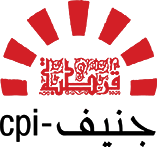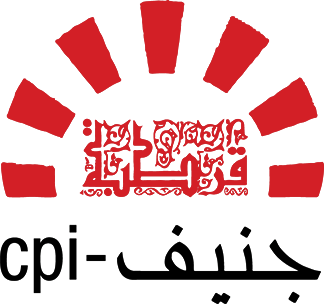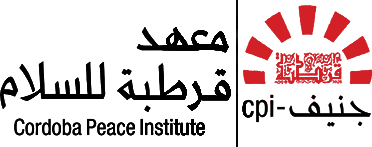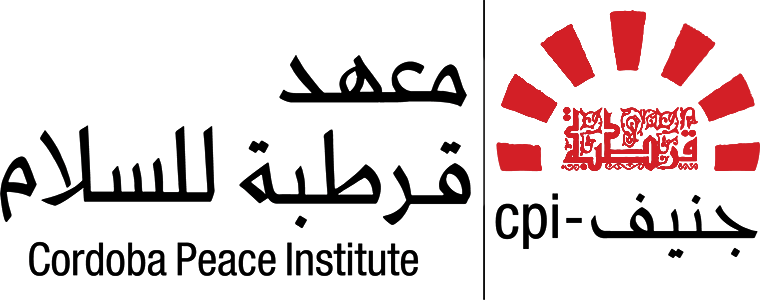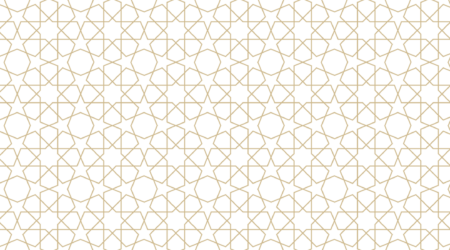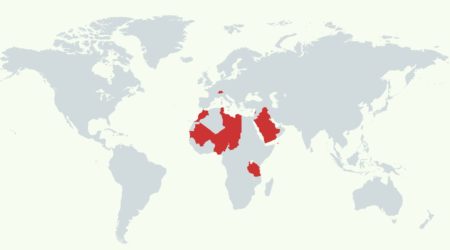Weekly Update 06-12.01.2015

1) MAROC
» 10.01.2015 : Sondage sur l’utilité de la participation politique
Un sondage réalisé par l’Institut des études « Averti » montre que 83% des citoyens marocains questionnés ont exprimé leur non engagement ou affiliation et leur non soutien aux partis présents sur la scène politique. Le sondage a inclus 1084 citoyens de 40 villes marocaines. Ces résultats ont été présentés à la capitale Rabat lors d’un séminaire sur «l’utilité du vote lors des élections». La synthèse du sondage indique que 64% des citoyens s’intéressent à l’action politique tandis que 15,40% ne s’intéressent pas. En ce qui concerne les raisons principales derrière la participation dans les prochaines élections, 47,50% ont lié leur participation avec le devoir de citoyenneté, tandis que 24,70% ont confirmé leur participation qui trouve sa justification dans la volonté de développer la démocratie locale, 13,20% l’ont justifié par leur engagement partisan, tandis que 45,90% ont confirmé que la raison principale de leur non-participation est due à la corruption des candidats.
http://www.hespress.com/politique/251681.html
2) LIBYA
» 10.12.2015: Leon’s Libyan Dialogue Encounters Hurdles along the Road to Geneva
UNSMIL announced over the weekend that a new round of Libyan political dialogue would take place in Geneva on Wednesday 14 January, this week. Despite the shuttle diplomacy effort, that Bernardino Leon seems to have carried out to consult with actors and stakeholders of the Libyan conflict in both Tripoli and Tobruk, it is very unlikely that all parties invited would go to Geneva. There are divisions on both sides of the conflict. Faraj Hashim, spokesperson of the Hafter-backed Tobruk House of Representatives (HoR) announced that a group of Tobruk parliamentarians flew to Geneva without any coordination with the Tobruk Theni-government. Likewise, the Hassi government and the GNC in Tripoli seem to be undecided. After a lengthy session of the GNC on Monday, the Congress decided to postpone the decision on whether to go to Geneva till next Sunday. The GNC considers that Leon did not allow enough time for consultations and that his roadmap, as summarised in the UNSMIL’s press release, still lacks detail. Leon hopes that the Geneva dialogue would lead to agreement on a national unity government and a consensus on how to manage the remainder of the transition period until a new constitution (already drafted) is adopted by referendum. It appears that some key actors within the GNC are sceptical of the idea of a dialogue outside Libya. Other groups within the GNC think that Leon’s plan does not state a well-defined framework for the dialogue process, timeframe, and guarantees. UNSMIL’s list of invitees only arrived at the GNC in Tripoli late at night on Monday 12th, which is arguably very late notice for a dialogue supposed to start a day later. Reportedly, the list contains the names of four members from the GNC, four Tobruk parliamentarians, four former members of the 2011 Transitional National Council, and five independent figures. Leon did meet with Hafter before the Geneva dialogue round was announced. It is unclear whether Hafter would be invited to Geneva. According to sources close to the GNC, Hafter’s participation would be a deal-breaker, and would undermine any hope of going to Geneva. With division on each side of the divide and within each camp of the conflict it is very unlikely that Leon will manage to bring all actors in the Libyan conflict to the dialogue table in Geneva this Wednesday.
http://unsmil.unmissions.org/Default.aspx?ItemID=1992858
http://www.alwasat.ly/ar/news/libya/55782/
3) TUNISIA
» 6.01.2015: Divisions within Nidaa Tounes Delay Formation of New Government
Almost two weeks after his designation to form a new government, Habib Essid has not yet managed to reconcile all key actors and stakeholders to be able to do so. The Popular Front, with 16 seats in the parliament, had already indicated its decision to stay in opposition as soon as President Caid Essebsi nominated Essid PM. While some observers think that Essebsi’s reference to a possibility of including Ennahdha in the new government might explain Hama Hamami’s (leader of the PF) decision to opt for the opposition, others consider that it was rather an ideological divergence on the social and economic policies with Nidaa Tounes that underpinned Hamami’s decision. Divisions within Nidaa Tounes are not helping Essid’s uphill task either. Last week, Khemaies Ksila, member of the Politburo of Nidaa Tounes, criticised publicly Mohsen Marzouk and Rafaa Ben Achour, two advisers in Essebsi’s cabinet. Ksila considered that both advisers “represent the biggest danger for Nidaa Tounes and Tunisia … and that they act with a clique spirit … in order to dominate the party and exclude elected members of the parliament from consultations to form the government.” Ennahdha’s communique over the weekend, following a two-day meeting of its Consultation (Shura) Council, stated that the Movement is “ready to join the new government in the event of receiving an official invitation and if the consultations would lead to consensus on the government’s project and its priorities.” For Kapitalis, a liberal outlet of the business community in Tunisia, including Ennahdha in the new government would amount to committing political suicide, and Nidaa Tounes would then face the same fate as Moncef Merzouki’s Congress for the Republic and Mustapha Jaafar’s Takattoul parties, which were severely punish by Tunisians in the last legislative and presidential elections.
http://www.kapitalis.com/politique/26742
http://www.kapitalis.com/politique/26822
http://www.ennahdha.tn/
4) EGYPTE
» 08.01.2015 : Rapprochement entre l’Egypte et le Qatar, coup dur pour les Frères musulmans d’Egypte ; quelles conséquences pour le Hamas ?
Suite à une initiative saoudienne de médiation entre l’Egypte et le Qatar inaugurée le 20 décembre dernier, al-Jazeera a annoncé la fermeture de sa chaîne Mubashir misr (l’Egypte en direct). Cette annonce vient frapper les Frères musulmans en Egypte qui perdent ainsi une plateforme médiatique très influente. Cette initiative de rapprochement soulève de grands débats. Certains médias rapportent qu’une des conditions émises par l’Egypte, qui serait l’arrêt de tout soutien qatari aux Frères musulmans en Egypte et en Palestine, aurait provoqué une scission interne dans le gouvernement qatari entre ceux qui y sont favorables et ses opposants. D’autres médias annoncent que ce rapprochement pourrait être suivi par un autre, celui de l’Egypte avec la Turquie, avec le Qatar comme médiateur. Une autre question très débattue est la position du Qatar face au Hamas. Certaines sources d’information soutiennent que la rupture des liens avec les leaders du Hamas serait aussi demandée par l’Egypte. Des déclarations divergentes ont été faites sur un arrêt de l’aide financière qatarie au parti palestinien et sur une invitation à quitter l’émirat adressée à Khaled Meshaal, tout cela dans un contexte où Hamas semble vouloir rétablir des liens avec Téhéran.
http://www.al-monitor.com/pulse/originals/2015/01/al-jazeera-egypt-suspension.html
http://www.eremnews.com/?id=97043
https://www.middleeastmonitor.com/articles/middle-east/16043-will-qatars-new-links-with-egypt-change-turkeys-position
http://www.egyptindependent.com//news/turkey-follows-qatar-s-steps-reconciliation-egypt
http://www.al-monitor.com/pulse/originals/2014/12/egypt-qatar-rapprochement-hamas.html
http://www.washingtonpost.com/blogs/worldviews/wp/2015/01/06/has-the-head-of-hamas-been-kicked-out-of-qatar/
5) YÉMEN
» 05.01.2015 : Les Houthis s’opposent à une division en six régions de l’Etat fédéral
Lundi 5 janvier, le Comité de rédaction de la nouvelle constitution a présenté un projet incluant la division du Yémen en six régions dans la fondation d’un Etat fédéral, comme il en avait été convenu lors du Dialogue National. Les Houthis, qui avaient un représentant dans ce comité, ont cependant refusé le projet, s’opposant à la division en six régions, reprochant à ce découpage de ne pas tenir compte des questions de populations et de répartition des ressources. En effet, la région de Azal, qui comprend les gouvernorats de Saada, d’Amran, de Dhamar et de Sanaa, et dans laquelle les Houthis privilégient d’une forte influence, n’a pas d’accès à la mer. Les Houthis se disent favoriser une division en deux régions, région du nord et région du sud, ce qui coïncide avec la demande des séparatistes du sud et du parti socialiste.
http://www.yementimes.com/en/1849/news/4775/Islah-MP-condemns-meeting
Archive :
http://www.aawsat.net/2014/12/article55339325
6) SAHEL
Mali:
» 10.01.2015 A new government has been formed in Mali
A new government, the third one of the presidency of Ibrahim Boubacar Keïta (IBK), was formed in Mali after the replacement of the Prime Minister Moussa Mara by Modibo Keïta last Thursday. Moussa Mara had assumed his function only last April 2014, at the same time as Modibo Keïta was nominated high representative of the President for the peace negotiations with the armed groups that took place in Algiers. This change of Prime Minister is deemed as a sign of political softening by the President since Moussa Mara firmly opposed the idea of federalism while Modibo Keïta is a charismatic political figure with experience that dates back to the 1980’s and who is perceived as a rallying man, including from the Tuareg side. The new government, comprising 29 membres (as compared to 31 for the previous government), was announced last Saturday and sees the departure of 8 Ministers, among them the Ministers of Defence, Economics and Communication. Two Ministers, Mohamed Ag Erlaf (Environment) and Zahabi Ould Sidi Mohamed (Reconciliation), who are said to be close to Tuareg armed groups have joined the new government. Nevertheless, no members of the opposition have been nominated. The new government’s priority will be the settlement of peace in the Northern part of the country.
http://fr.africatime.com/mali/articles/lavenir-politique-du-mali-la-relance
Chad:
» 07.01.2015 Chad threatened by attacks from Boko Haram in the Lake Chad region
More than 3,000 Nigerians have sought asylum in the region of Lake Chad since mid-December as a result of attacks from Boko Haram in the Northern-Eastern part of their country. The government of Chad has taken some measures to ensure the security of these affected populations and provide them with the necessary humanitarian assistance. On January 3rd the armed group took over an important military base, located at the entrance of the city of Baga, which was hosting the MNJTF (Multinational Joint Task Force). It returned on January 7th to attack the city and its surrounding villages. This means that Boko Haram now controls the whole of the Nigerian territory that shares borders with Niger, Cameroon and Chad. In addition to its economic and commercial impact, this situation raises serious concerns on the possibility for the government of Nigeria to maintain presidential elections that shall take place on February 14th. Chad is considering joint attacks with Nigeria and Cameroon against Boko Haram in the region.
Nigeria:
» 09.01.2015 : Le pire massacre dans l’histoire de Boko Haram
Un nouveau raid meurtrier a été mené mercredi dernier le 7 janvier par le groupe armé Boko Haram. Ce dernier a détruit 16 villes et villages dans le nord-est du Nigéria, notamment dans la ville stratégique de Bagna. Selon Amnesty International c’est le pire massacre perpétré par Boko Haram laissant derrière plus de 2000 morts et plus de 20.000 déplacés.
http://www.amnesty.org/en/for-media/press-releases/nigeria-massacre-possibly-deadliest-boko-haram
http://www.jeuneafrique.com/Article/ARTJAWEB20150109184917/d-fense-s-curit-terrorisme-boko-haram
The views and perspectives contained in the Weekly Update are from individual contributors and external sources, and do not necessarily reflect the opinions or position of the Cordoba Foundation of Geneva. The links are neither intended as an endorsement of particular publications nor the only source for the updates, but to connect to information in the public domain, for those interested in background or further details.
